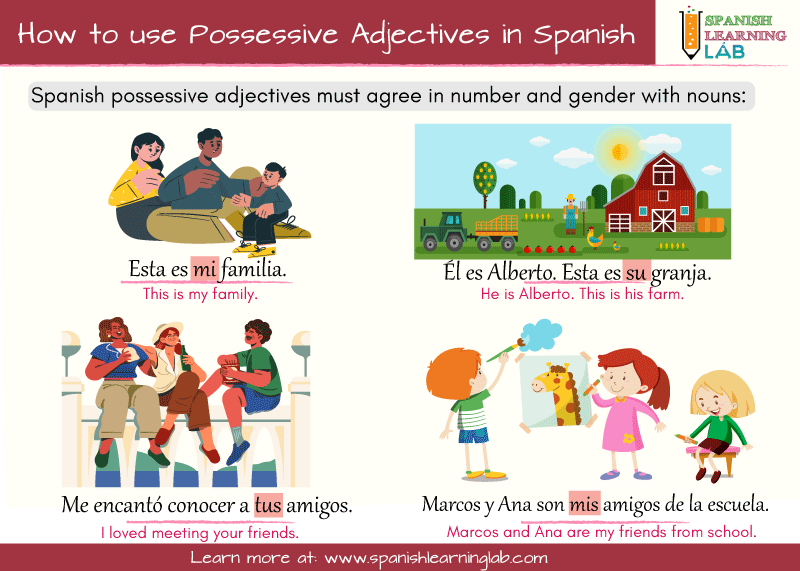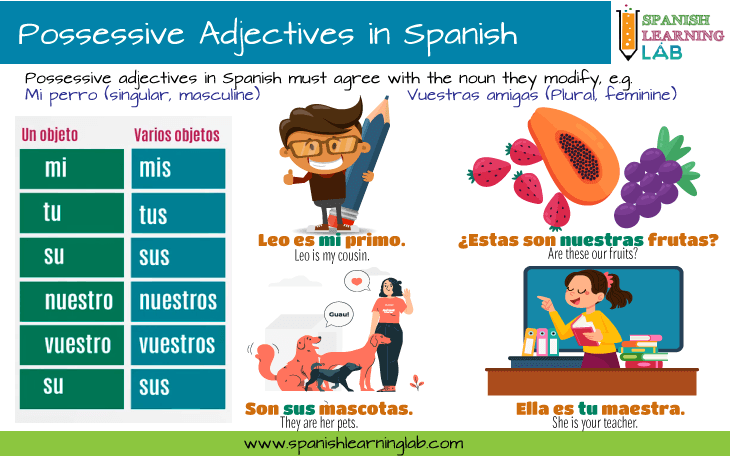There are three different ways to talk about our possessions in Spanish. The first way is through possessive pronouns, the second is by using the preposition DE (of) and the third, and perhaps the most popular way, is by using Spanish possessive adjectives. In this grammar lesson, we will focus providing examples of sentences expressing possession with these words and explain the rules to use them appropriately. Let’s start…
What are Spanish possessive adjectives?
Possessive adjectives in Spanish or “Los adjetivos posesivos” are words that tell us who owns something. They are words like MI (my), TU (yours) and so on, which are always placed before a noun as shown in these two examples:
- Ellos son mis padres. (they are my parents).
- Esos son tus libros. (those are your books.)
Now, please take a few minutes to watch the following video on the rules to use possessive adjectives in Spanish to form sentences. The video includes a chart with these words and many examples that will help you understand the rest of the lesson more easily.
Where should you place possessive adjectives in Spanish?
Spanish possessive adjectives are always placed before nouns or words, just like in English. Therefore, if we want to say “His car is new” in Spanish, then we just need to find the proper possessive adjective (SU) and say “Su carro es nuevo”, where CARRO is the noun this person owns. In this sentence, we assume that we are talking about a man, but “su” can also be used for a woman’s possessions.
A chart for possessive adjectives in Spanish
This chart shows the equivalents for each possessive adjective in Spanish as compared to the English language.
| Possessive adjective | Singular | Plural |
|---|---|---|
| My | Mi | Mis |
| Your | Tu | Tus |
| His, her, its, your | Su | Sus |
| Our | Nuestro/Nuestra | Nuestros/Nuestras |
| Your | Su/Vuestro/Vuestra | Sus/Vuestros/Vuestras |
| Their | Su | Sus |
Noun-adjective agreement rules
Unlike their English counterpart, possessive adjectives in Spanish must agree in gender (masculine/feminine) and number (plural/singular) with the noun they own. Most of these words have an invariant gender, that is, they will not change from feminine to masculine no matter the word they modify. “MI”, “SU” and “TU” are invariant in gender, but they will have a plural form too, as shown in these three sentences:
- Mi hermano compró un auto. (My brother bought a car.)
- Mi hermana compró un gato. (My sister bought a cat.)
- Mis hermanos compraron dulces para la fiesta. (My siblings bought candy for the party.)
The picture below shows four different sentences about “possessions” to illustrate how possessive adjectives in Spanish must agree in number and gender with the noun they modify.

To talk about shared possessions, we will use “Nuestro” for masculine nouns like “Nuestro perro” and “Nuestra” for feminine nouns like “Nuestra mascota“. Again, you will have to add “-S” to “nuestro” when referring to several objects:
- Olvidamos nuestra tarea en casa. (We forgot our homework at home.)
- Nuestros libros están sobre la mesa. (Our books are on the table.)
Following these rules, for a singular noun such as CARRO, we could use a Spanish possessive adjective in singular form like “MI” or “SU”, but not one in plural form like “SUS” or “MIS”, e.g. “Mi carro” and “Tu carro”. Likewise, a plural noun like FLORES (flowers) would need a possessive adjective in plural form, which are formed by adding the letter “S” at the end of the word in singular form, e.g. SU -> SUS, MI -> MIS: “Mis flores”, “Sus flores…” and so on.
Making Sentences with Possessive Adjectives in Spanish
In order to make sentences with possessive adjectives in Spanish, we just need to keep in mind the rules about noun-adjective agreement and placement explained before. Imagine you want to say: “Her husband is an artist and my brother too”. This sentence includes two possessive adjectives: HER and MY. According to the chart above, SU corresponds to HER and MI to MY, so we should say “Su esposo es artista y mi hermano también“. All you need to do is to find a possessive adjective that matches our possessions, just like we did in the examples provided in the following picture:

Remember that some Spanish possessive adjectives will change their ending to -A or -O (nuestro -> nuestra) depending on the gender of the noun they modify, for example: Nuestra casa… (our house) and Nuestro amigo (our friend). Know that “Vuestro(a)” will only be used in Spain, not in Latin America where the possessive adjectives SU or TU are more common, with no change in meaning:
- Es un gusto poder conocer a tu familia. (It’s a pleasure to meet your family. – LATAM)
- Es un gusto poder conocer a vuestra familia. (It’s a pleasure to meet your family. – Spain)
Sentences using possessive adjectives in Spanish
Listen and analyze this last group of sentences using possessive adjectives in Spanish, and notice how they follow the rules we explained throughout the lesson.
|
Mi nombre es Carlos y su nombre es Juan
My name is Carlos and his name is Juan
|
|
Mis amigos son muy divertidos.
My friends are very fun
|
|
¿Tu papá vive contigo?
Does your father live with you?
|
|
¿Dónde están tus primos?
Where are your cousins?
|
|
Ella es una buena chica. Sus padres son amables
She is a good girl. Her parents are very kind.
|
|
Nuestra meta es terminar esto para el viernes.
Our goal is to finish this by Friday.
|
|
Nuestros patrocinadores son muy exigentes.
Our sponsors are very demanding.
|
|
¿A vuestros amigos les gusta este tipo de comida?
Do your friends like this type of food?
|
|
Su mama y sus hermanos son tan listos
Her mom and her siblings are so smart
|
Related Spanish Worksheets:
- Possessive Pronouns in Spanish – PDF Worksheet (Chart and sentences)
- Possessive Pronouns in Spanish – PDF Worksheet (Sentences)
- Possessive Adjetives in Spanish – PDF Worksheet
When I selected “mis” as the answer for question #6, it said I was incorrect, then your explanation showed that I had chosen the correct answer. I want to recommend that my students take this quiz, but we would need that mix-up taken care of first…
¡Hola! Thank you for finding the mistake. I had not noticed I had chosen a wrong answer, but at least the explanation was correct. I hope sus estudiantes find this useful. 🙂
I believe the answer is correct Ellen thanks for your input though…
That is quite enough Jackson now you can’t go hurting Ellen’s feelings. She might be wrong but still it is very unkind of you to go out of your way just to tell her that she is incorrect on her hypothesis so please delete your account or I will have to report you to the police or you can fight me on roblox boii I am Thomas Hunter supreme commander of the Forest Guard and i see great evil decimating much of my beautiful world and my army is dwindling and there is an epic threat I am Thomas and i am forced to supplement my fighter with new recruits aged from 16 to 17 from thousands four of us will be chosen to lead a special mission. Unknown to me, us chosen four are redirected to a different endgame we must find the seven lost books of history before the dark one. For the seven books have immense power over the past present and future controlling not only the destiny of my world…but that of ours as well. SO thank you for your useless pieces of information bud i think you just took the L on this.#minecrafter#served#rekt#EllenDegeneres#saved#roblox4life